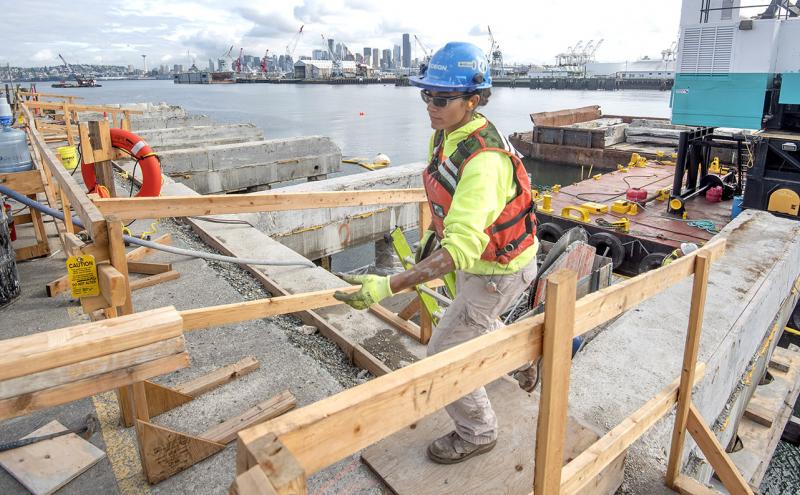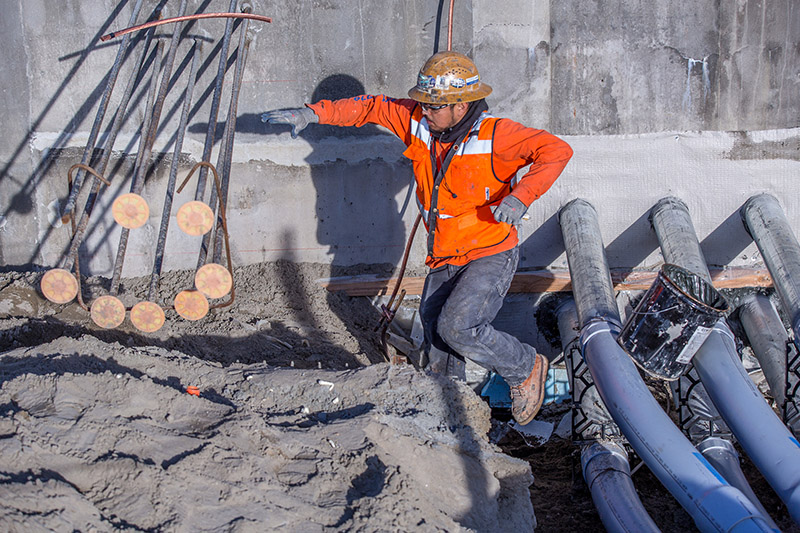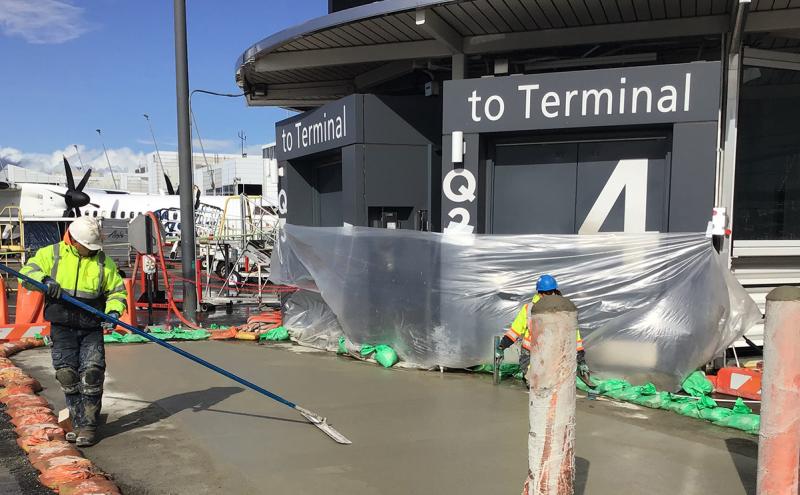
Paul Molia was looking for the right opportunity to start over. After going down a rocky path and ending up in jail, he knew he needed to make a change.
“I felt like my life was hopeless,” he said. “I was going from job to job and house to house arguing with my ex and getting frustrated with where I was at in life.”
But an opportunity came along when he needed it the most. One day, he saw a television commercial promoting careers in ironworking and something clicked. Molia wondered if this new career path could be the change he needed. The Priority Hire Program helped him connect to resources, remove barriers, and realize his career goal.
The Priority Hire Program supports access to family wage jobs to qualified construction workers from economically distressed areas and to historically underrepresented workers in the construction industry. Molia’s dream became a reality through the Ironworkers Direct Entry Pre-Apprenticeship Program sponsored by the Port with support services from Urban League of Metropolitan Seattle.
Priority Hire focuses on the entire worker development process — from recruitment to pre-apprenticeship training to job placement and referrals into construction careers — to create economic opportunities that remedy racial and social inequities and invest tax dollars back into local communities.
Molia is currently a second-year apprentice working at Climate Pledge Arena as part of the “take down crew,” removing temporary support beams that have been holding the structure up during construction.
“It’s amazing how it changed my life; I have a good salary and good benefits,” Molia said. “(My coworkers and I) support each other to stay happy, safe, and uplift each other. You’ve got to stay positive because this job can be very hard; but if you can do this, you can survive anything.”
Since the City of Seattle enacted a Priority Hire ordinance in 2015, several regional public agencies including the Port have adopted the Priority Hire program. Under Priority Hire, public agencies set goals for contractors to hire women, Black, Indigenous, and other people of color (BIPOC), and residents from economically distressed communities.
“The Port of Seattle directly supports community-based organizations that help build a stronger and more equitable pipeline of women and people of color apprentices through outreach and training programs,” said Luis Navarro, Port Director of Workforce Development.
The City began its Priority Hire pilot program in late 2013. Since then, workers living in economically distressed communities have earned $25.7 million in wages, an estimated $12.4 million more than they would have earned without the program.
Priority Hire Program
This program supports equitable economic growth in communities by:
- Prioritizing women, people of color, and local workers living in economically disadvantaged neighborhoods
- Providing training and employment to BIPOC workers as part of the construction workforce
- Creating a better work environment with safety protections, dispute resolution, and a grievance process
Regional partnerships
Construction workforce diversity programs like Priority Hire have successfully created equitable access to construction careers. But racial, gender, and economic disparities continue to exist in the construction trades industry and larger community.
For the first time, the City of Seattle, the Port of Seattle, and Sound Transit are collaborating to support the regional effort to improve apprenticeship retention and further equity in workforce development and Priority Hire programs. Together, they are investing $1.75 million to reduce existing racial disparities in construction and in the larger community through access to family wage jobs, training, and support for workers. Each partner is making significant investments in the program: Port of Seattle ($200,000), Sound Transit ($250,000), and the City ($1.2 million).
The new collaboration by the City, the Port, and Sound Transit furthers equity in workforce development and construction diversity programs. This collaboration invests in organizations led by historically underrepresented communities to close the equity gaps through:
- Outreach and placement into training and jobs, with a focus on justice-involved individuals
- Training and job readiness services that are culturally inclusive and prepare individuals for construction careers
- Support services that help residents of economically distressed communities, people of color, and women already working in construction to stay working and advance their careers
Under the partnership, the City will contract with seven organizations that have been selected to receive funding in 2021 and 2022:
- Apprenticeship & Non-Traditional Employment for Women (ANEW)
- Northwest Carpenters Institute
- Pacific Northwest Ironworkers & Employers Apprenticeship
- Rainier Beach Action Coalition
- Seattle Central College – PACT Pre-Apprenticeship
- Tulalip Tribes of Washington – TERO Vocational Training Center
- Urban League of Metropolitan Seattle (ULMS)
Prospective apprentices can contact these organizations to learn more about their programs.

Improving retention
Priority Hire can open doors to a financially rewarding career, but the road from apprentice to journeyman can be tough for those without resources or a support network.
Michelle Merriweather, President of Urban League of Metropolitan Seattle, said retention has been one of the biggest challenges for women and people of color pursuing careers in the construction industry. Urban League has provided Priority Hire support services to help provide recruitment, training, and employment for the construction workforce.
According to the City of Seattle’s 2019 Priority Hire Annual Report:
66% of the 203 people placed through Priority Hire Investments in 2018 stayed in construction after one year — falling short of the 75% retention goal
“The construction industry hasn’t traditionally welcomed women or people of color,” Merriweather said. “Their peers may be less receptive to them being there because they are black or a woman. It’s been a good old boy network but that’s changing; the focus on retention is really important.”
Priority Hire workers often face a number of additional barriers to success, which can include the need for childcare, living without a paycheck during the pre-apprenticeship training, and a lack of transportation for those who live far from Seattle construction jobs.
If workers have the financial resources to make it through the unpaid pre-apprenticeship program, compensation received for apprentice- and journey-level experience will more than make up for the initial struggle, Merriweather said. After fulfilling the required on-the-job and instructional hours, graduating apprentices attain journey-level status and receive full pay for the skills they have earned.
“Programs like ours are great because we are able to link those in our workforce development equity programs with other things we offer which can help cover barriers to get into the industry,” Merriweather said. “Workers can receive help with rental support, access to construction equipment like boots and work gear, and childcare for a certain amount of funds, all of which is included in our contracts with the Port and other public agencies.”
Equitable recovery
COVID-19 has had a major, disruptive impact on the regional economy and has worsened disparities in communities of color. Essential services work in aviation and maritime, transportation, and other City and regional investments, continues to provide a platform for economic activity, supporting those who may be most disproportionately impacted by potential changes in the construction job market.
Investing in programs that lead to economic growth and job creation in areas that experience economic distress and that focus on historically underrepresented groups are more important than ever.
“Priority Hire puts the focus on where it needs to be — marginalized communities, black people, and women — and offers them entry to a sector with ample opportunity to support a career that can change the trajectory of someone’s life,” Merriweather said. “In a time where there has been a drastic shift resulting in job loss in the hospitality industry, it provides an opportunity for folks who are willing to learn a new job trade, an opportunity that will sustain themselves and their families. If we can reduce barriers to success like rent, racism, and childcare, we can help provide a pathway to a new opportunity they may not have considered before.”
Merriweather said the construction industry offers endless opportunities for workers to grow and succeed.
“I don’t know that we as a community celebrate those that do this work enough and give them enough credit. We often push our young people into college which can lead to great success, but there are folks that have journeyed out and do great things or are great leaders, making a high wage that have done it with their hands. We need to honor that and share that opportunity with folks and offer that pathway as well.”









